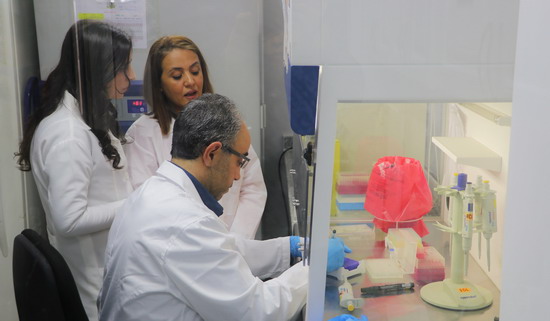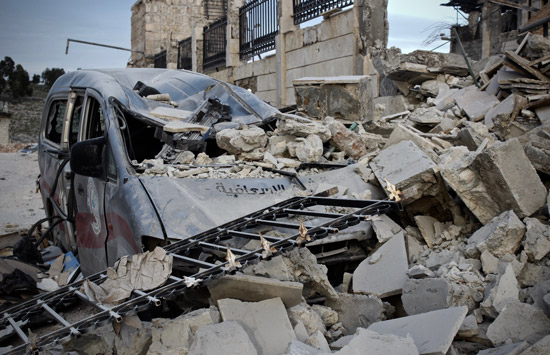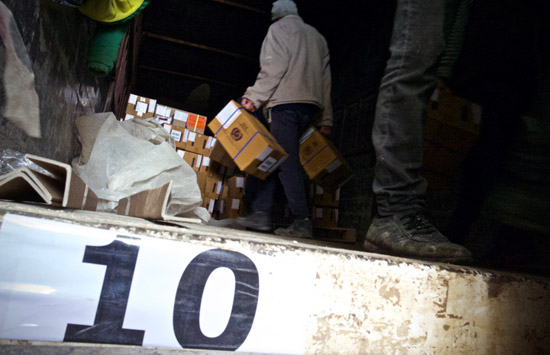WHO continues to support the fight against coronavirus in Syria
 2 April 2020 – The World Health Organization (WHO) is working closely with the Syrian Ministry of Health to enhance Syria’s preparedness and response to COVID-19. WHO’s support focuses on 4 main priorities:
2 April 2020 – The World Health Organization (WHO) is working closely with the Syrian Ministry of Health to enhance Syria’s preparedness and response to COVID-19. WHO’s support focuses on 4 main priorities:
- enhancing surveillance and expanding laboratory testing for early detection of cases;
- protecting health care workers by providing them with protective equipment;
- ensuring proper case management, isolation and contact tracing; and
- raising awareness and conducting risk communication.
“WHO classifies Syria as among the high-risk countries in the Eastern Mediterranean Region, as a result of challenges in the health system resulting from over 9 years of conflict in the country,” said Dr Nima Abid, acting WHO representative in Syria. “WHO continues to aggressively support the health sector in Syria to ensure its preparedness and response to combating COVID-19 in the country.”
In 4 years, 494 attacks on health killed 470 patients and health staff in Syria
Every 4 days in 2019, a health facility in Syria was attacked. A majority occurred in the northwest, where the world‘s most urgent humanitarian crisis continues to unfold.
 March 2020, Geneva/Copenhagen/Cairo – The World Health Organization condemns in the strongest terms, attacks on health care that have been a hallmark of the complex humanitarian crisis in Syria that this month enters its tenth year.
March 2020, Geneva/Copenhagen/Cairo – The World Health Organization condemns in the strongest terms, attacks on health care that have been a hallmark of the complex humanitarian crisis in Syria that this month enters its tenth year.
“The data we can now reveal on attacks on health in Syria is a grim testament to a blatant disrespect for international humanitarian law and the lives of civilians and health workers,“ said Richard Brennan, WHO‘s Regional Emergency Director in the Eastern Mediterranean.
Of all armed conflicts across the globe, Syria has for years been one of the worst examples of violence affecting health care. Intentionally attacking sites where the sick and wounded are treated, to either restrict or deny civilians access to health care, is prohibited under international humanitarian law. Indiscrimate attacks in civilian areas can also result in damage to health care, reflecting a callous disregard for lives and welfare of the most vulnerable.
“What is troubling, is that we‘ve come to a point where attacks on health – something the international community shouldn‘t tolerate - are now taken for granted; something we have become accustomed to. And they are still taking place. Only 2 weeks ago, 2 hospitals in Idleb governorate were carried out, injuring 4 health workers and temporarily suspending services,“ said Brennan.
A total of 494 attacks on health were confirmed between 2016 and 2019,1 of which 68% or 337 attacks were recorded in Syria’s northwest; among the last areas in the country that are not under government control. The data show that attacks on health in Syria peaked in 2016 and were lowest in 2019, likely due to the reduced size of the area where active fighting was taking place. The fact that the northwest – Idlib, Aleppo and Hama – has suffered the lion’s share of attacks compared to other regions in Syria, is notable. In 2019, 82% occurred in the northwest, 49% in 2018, 58% in 2017 and 85% in 2016.
The total death toll in attacks on health care in Syria between 2016 and 2019 is 470, peaking in 2016 with 241 confirmed deaths. The lowest number of deaths recorded was in 2019 at 54, again due to the reduced territory undergoing military operations. Northwest Syria represents the highest total numbers of deaths in those 4 years – 309 or 66%.
In addition to the deaths, 968 people were injured by these attacks across Syria since 2016; many of whom have been left with permanent disabilities.
“A clear example of how conflict impacts an individual’s right to health is northwest Syria, where today only half of 550 health facilities remain open either due to insecurity, damage from previous attacks, threats of future attacks, or surrounding areas being completely deserted as people are forced from their homes,” Brennan marks.
“Health facilities are now the least safe places in the area,” said one physician, a few days after 2 hospitals in Darat Izza were hit in an airstrike on 17 February 2020. Another physician working in a child and maternity hospital in Harim in Idleb governorate, described to WHO how he and his medical team worked in constant fear of shelling.
In September last year, an internal UN Board of Inquiry started investigating a series of incidents in northwest Syria, since the signing of a Memorandum on Stabilization of the situation in the Idlib De-escalation area between the Russian Federation and the Republic of Turkey on 17 September 2018.
The investigation covers destruction of or damage to facilities on the deconfliction list, containing UN-supported humanitarian sites such as health facilities. The previous month, two thirds of the United Nations Security Council requested an inquiry based on the suspicion that making their location public through deconfliction had made these facilities a target and that some of the attacks had been deliberate. The Board of Inquiry has yet to present its findings.
So far, in 2020, confirmed attacks on health in Syria are 9 – all of them in the northwest - resulting in 10 deaths and 35 injuries.
For more information:
Hedinn Halldorsson
WHO Gaziantep
+90 538 544 29 57
Inas Hamam
WHO Regional Office for the Eastern Mediterranean
+20 01000 157 385
_________________________
1. Two systems for data collection of attacks on health care were used within this period; secondary data from WHO‘s Health Cluster in Syria and findings previously published in the Lancet, covering 2016-2017, while WHO‘s Surveillance System for attacks on health care (SSA) covers 2018-2019. The two systems are compatible in that the basic methodology used for verification of incidents was the same.
WHO combats misinformation circulating on COVID-19
5 March 2020, Damascus - The World Health Organization (WHO) categorically refutes the misinformation circulating on social media that has been falsely accredited to WHO related to COVID-19 in Syria.
As per a statement by the Regional Director for the Eastern Mediterranean published on Tuesday 3 March, 2020, "1682 cases of Covid-19 disease in 14 countries in the Eastern Mediterranean Region, as of 2 March, at 6 pm local time in the city of Cairo, including 66 reported deaths in Islamic Republic of Iran.” Syria is not among these 14 countries.
WHO is working closely with the Syrian Ministry of Health with the aim of enhancing health preparedness and response to COVID-19, in accordance with the International Health Regulations (IHR 2005). Under this agreement, any cases of COVID-19 or other communicable diseases are directly reported to WHO.
WHO is working with the Ministry of Health on a daily basis on ensuring preparedness measures for the disease. WHO continues to provide technical guidance and support to the Ministry of Health. Public health laboratories in the Ministry of Health have been provided with laboratory kits sufficient to test a thousand people to diagnose potential COVID-19 cases.
WHO is also woking with the Ministry on raising public health awareness and encouraging healthy hygiene practices such as washing hands with water and soap frequently, following correct coughing and sneezing protocols, and avoiding crowded places. All these are key to protecting people from COVID-19.
According to WHO’s Director General, "our first enemy is not the virus; it is rather fear, and rumours about it." WHO recommends that only reliable sources of information such as WHO’s website and Ministry of Health platforms be used when verifying any information related to COVID-19.
Statement by the Regional Director Dr Ahmed Al-Mandhari on COVID-19 in the Eastern Mediterranean Region
3 March 2020
More information and guidance from WHO regarding the current outbreak of novel coronavirus
Syria: Health workers describe mayhem as WHO delivers urgent medicine and supplies to ensure continued health services
WHO provides more than 225 000 courses of treatment to internally displaced Syrians in Idlib and Aleppo
 28 February 2020, Geneva/Copenhagen/Cairo – In a two-day operation the World Health Organization sent 55 tons of medicine and medical supplies in 7 trucks from Turkey into Idlib governorate and parts of Aleppo. Since December 2019 the area has witnessed the largest exodus of internally displaced Syrians in the 9-year history of the Syria conflict.
28 February 2020, Geneva/Copenhagen/Cairo – In a two-day operation the World Health Organization sent 55 tons of medicine and medical supplies in 7 trucks from Turkey into Idlib governorate and parts of Aleppo. Since December 2019 the area has witnessed the largest exodus of internally displaced Syrians in the 9-year history of the Syria conflict.
“This is the bleakest situation we’ve been in since the war started. Peoplehave no idea where to go, they only know they need to get away from the bombing,” says a surgeon in northwestern Aleppo governorate.
As hostilities and forced displacement towards the Turkish border continue the burden on health facilities is growing. Of the 84 health facilities forced to suspend operations since December last year just 31 have been able to relocate to places where people are seeking refuge from bombardments.
As a result, every 4 weeks 133 000 medical outpatient consultations do not take place, 11 000 trauma patients do not receive treatment and 1500 major surgeries are not performed.
Displacement has led to the depopulation of entire areas, resulting in disproportionate caseloads in Idlib's functioning health facilities. In some areas health facilities are deserted, in others they are stretched far beyond their capacity.
"These supplies meet a dire and growing need and will enable services to continue. In 3 months nearly 1 million people have been displaced”, says Richard Brennan, WHO Regional Emergency Director for the Eastern Mediterranean.
The supplies, transported in UN convoys via the Bab al Hawa and Bab al Sama border crossings on 25 and 26 February, included equipment for 3200 trauma and surgical treatments which is being distributed to WHO’s implementing health partners in more than 150 facilities - half of the functioning health facilities in northwest Syria.
“The burden and sacrifice of health workers in the northwestern governorates is unimaginable. It’s only a matter of days until we pass 1 million displaced people. That means health responders are working around the clock to serve patients, under enormous strain and often putting their lives on the line,” says Brennan.
While there has been a sharp rise in trauma cases, health workers are also treating respiratory tract infections due to poor shelter and harsh weather conditions, and complications of non-chronic diseases such as heart disease and diabetes which have been exacerbated by irregular access to medicines.
Partners of the World Health Organization providing health services in the area describe how overwhelmed health staff and facilities are.
“This is not sustainable. The majority of our hospital staff on the ground evacuated to the north with their families and then chose to return to Idlib city to continue taking care of patients. People’s mental health is poor, both of those seeking assistance and of health staff alike," said a pediatrician in Idlib city, before adding that there was neither the time nor the capacity to deal with issues that are not life-threatening,
“Primary health care centers and hospitals are trying to work with what they have but the caseload in some hospitals has doubled while resources are either what they were or less. The number of hospitals and health centers around us is still decreasing due to the frequent targeting of health facilities,” said a general practitioner working 10 km from Darat Izza in Aleppo governorate where two hospitals were attacked on 17 February. of particular concern are shortages of medicine, gloves, syringes and bandages.
As of 28 February, attacks on health care in Syria since the mass displacement started on 1st of December 2019 have caused 10 deaths and 37 injuries.
Stills and footage from Bab al Salam and Bab al Hawa border crossings, February 25-26, 2020.
For more information:
Hedinn Halldorsson
WHO Gaziantep
+90 538 544 29 57
Inas Hamam
WHO Regional Office
Cairo
+20 01000 157 385


